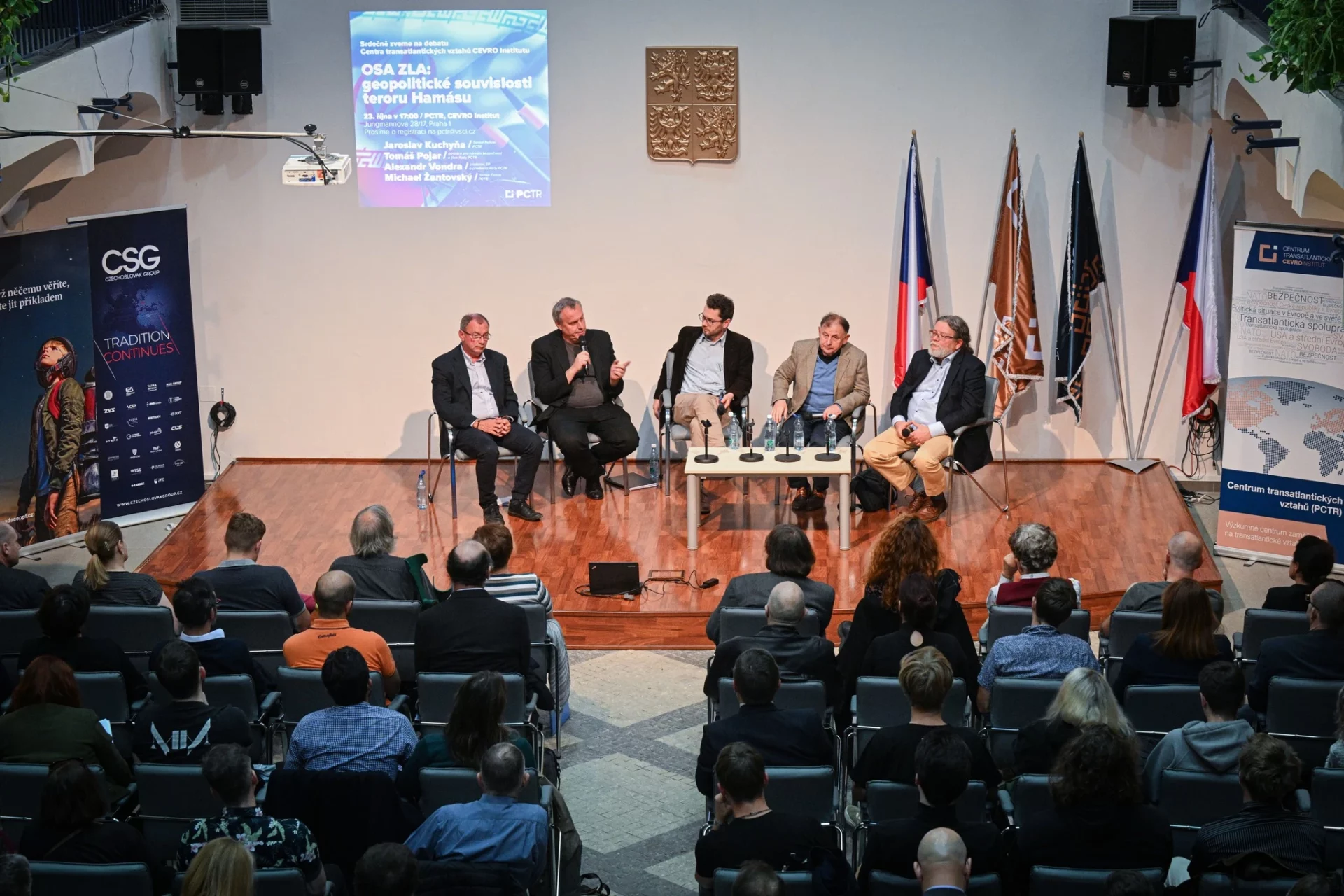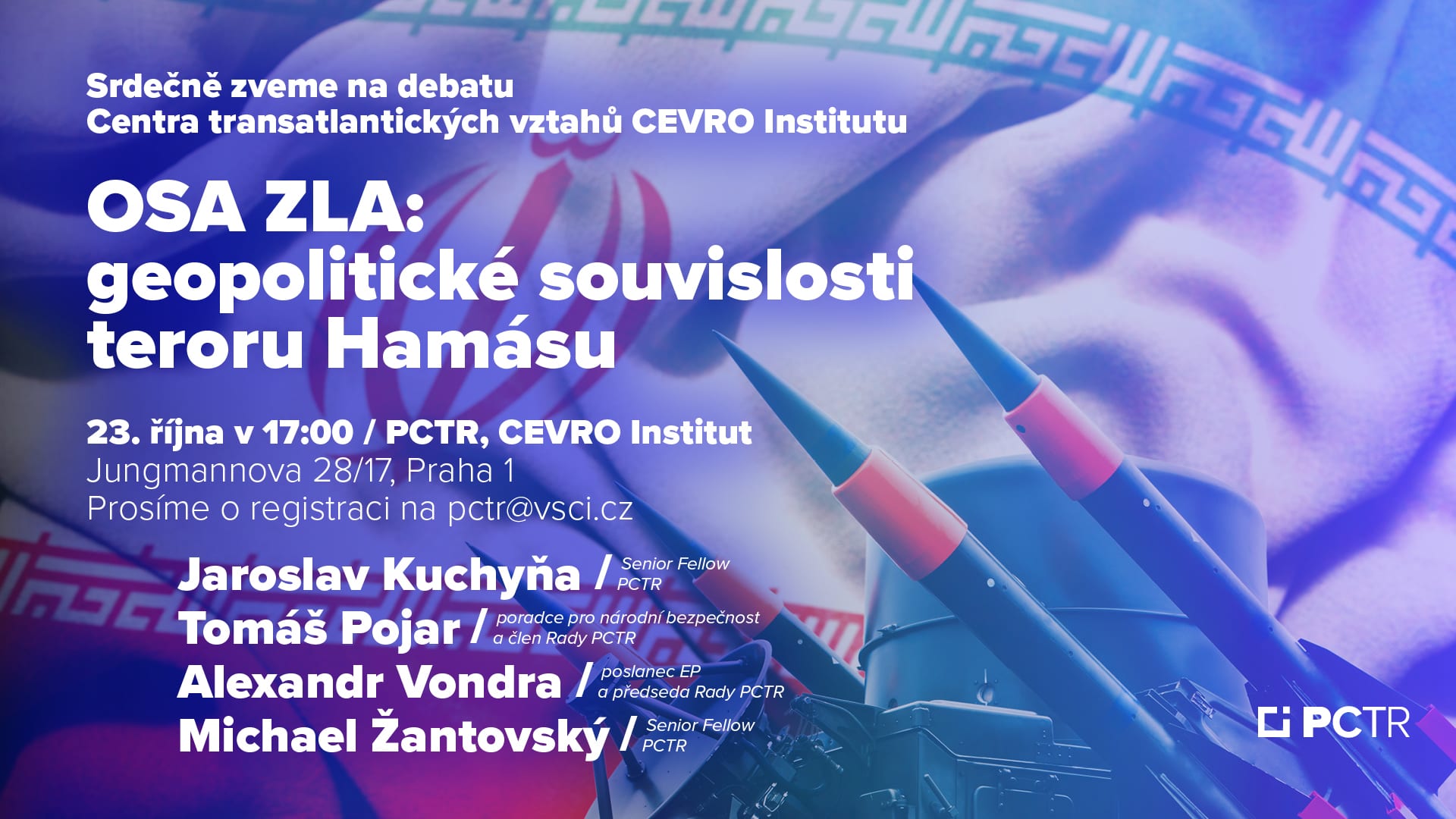Axis of Evil – Geopolitical Contexts of Hamas Terror
Date of the event: October 23rd

On October 23rd, a debate on the topic “Axis of Evil – Geopolitical Contexts of Hamas Terror” took place at the CEVRO College. The event was organized by the Center for Transatlantic Relations (PCTR). The participants included Member of the European Parliament and Chairman of the PCTR Council, Alexandr Vondra, National Security Advisor and PCTR Council member Tomáš Pojar, and PCTR experts Jaroslav Kuchyňa and Michael Žantovský. The debate was moderated by Jan Fingerland from Český Rozhlas.
The main themes of the debate revolved around assessing Israel’s response to current events, defining the “axis of evil,” and discussing the financing of Gaza.
When asked about who belongs to the new axis of evil, the consensus was that primary members include Hamas, Iran, and Russia. However, this axis extends its branches to many other countries such as North Korea, Syria, or Lebanon. Recent times have witnessed closer cooperation between Moscow and Tehran, particularly in the field of drone production. The supply of weapons from North Korea to Russia can also be observed in Ukraine.
According to Jaroslav Kuchyňa, secondary branches of this axis include countries hosting Hamas members, such as Turkey or Qatar. Tomáš Pojar added that China could also be mentioned due to its increasing collaboration with Iran. He further expressed the opinion that if an attack on Israel were to be done from Lebanon, the order for the attack would come from Tehran. “October 7th placed us in a new geopolitical situation, where conflict zones began to merge,” stated Michael Žantovský.
Israeli Response to Hamas Attack – Slow or Exemplary?
Tomáš Pojar argued that October 7th should not be seen as an absolute failure of the country’s security apparatus, as it is often described. He acknowledged that the Israeli response was slow but emphasized the challenging circumstances of facing two thousand well-trained and armed individuals attacking villages and cities. He questioned how quickly European countries would handle such a situation. He also mentioned that Hamas exploited the element of surprise at the end of the holidays. The speed of Israel’s response, therefore, should not be condemned. What is more striking is that Israeli security services did not intercept any information about such a large-scale operation beforehand. According to him, it is certain that numerous investigative commissions will be formed after the conflict to identify the mistakes in the Israeli security apparatus and why it did not react in time.
One of Israel’s possible mistakes was its significant focus on the West Bank, underestimating Hamas’s strength in Gaza. The Israeli armed forces admitted that tunnels leading from Gaza to Israeli territory were being dug deeper and were not as easily detectable as before. These tunnels allowed Hamas fighters to get behind the Israeli army bases and create confusion in their ranks. Another reason for the success of Hamas’s attack might be the organization’s acquisition of information about the positions of the IDF or their high-ranking officers among Palestinians working in Israel. Every day, up to 18,000 Palestinians leave Gaza for work in Israel.
Successfully infiltrating Hamas in the Gaza Strip is challenging for Israeli security services due to the difficulty and danger associated with staying in Gaza and joining Hamas for foreigners. In Gaza, with its two million inhabitants, everyone figuratively knows each other. Hamas’s internal counterintelligence is strong and scrutinizes every member.
Since October 7th, Western support for Israel has been evident – from symbolic visits of heads of several states to the presence of two US aircraft carriers in the Mediterranean Sea. However, there is no complete consensus in the European Union regarding full support for Israel, despite initial hearings in the European Parliament on barbaric attacks on civilians. For example, the EU’s chief diplomat, Josep Borrell, tended to almost defend Hamas’s actions and did not comment on Hamas blocking evacuation routes. Israel called on the civilian population of Gaza to evacuate. Tomáš Pojar stated, “If Israel were to follow the advice of European politicians, it would no longer exist multiple times over.”
The debate also touched on the issue of financing Gaza. Gaza has been funded primarily from abroad, including UN agencies and various donors. The debate guests discussed how the financing of Gaza and internal redistribution of funds occur. Israel collects customs for Gaza and the Palestinian Authority of the West Bank, from which it pays for the supply of electricity, water, and other things. It is not a direct collection of taxes in Gaza by Israel. Taxes in Gaza are the responsibility of Hamas, which also controls the distribution of foreign aid. The financing of hospitals and schools is problematic because Hamas builds its bunkers and tunnels under them. Therefore, there is a need to determine the boundary of what and how the West should finance. Tomáš Pojar said, “Just as we do not pay the Taliban in Afghanistan now, we should not pay Gaza. If someone should pay, it’s those who have incredible incomes from oil and gas at that moment, not those who pay incredible amounts for energy.” Alexandr Vondra added, “I believe that not a single cent from Europe should go there until they release at least all hostages because this is the only leverage we have.”
In his concluding remarks, Tomáš Pojar also addressed the issue of the spread of misinformation by Western media. He strongly criticized articles from outlets such as the BBC and New York Times about an alleged Israeli attack on a Palestinian hospital, which later turned out to be likely false. The BBC did not take any responsibility for this report, even after it was revealed that Israel was not responsible, but rather it was likely a mistaken missile from Islamic Jihad.
The fate of Gaza remains uncertain, but as the speakers mentioned, Israel does not plan a permanent occupation of the Gaza Strip, and there is a possibility of creating an international institution to manage Gaza.
A link to the debate recording: HERE
(Filip Homolka, Rachel Pojarová)


